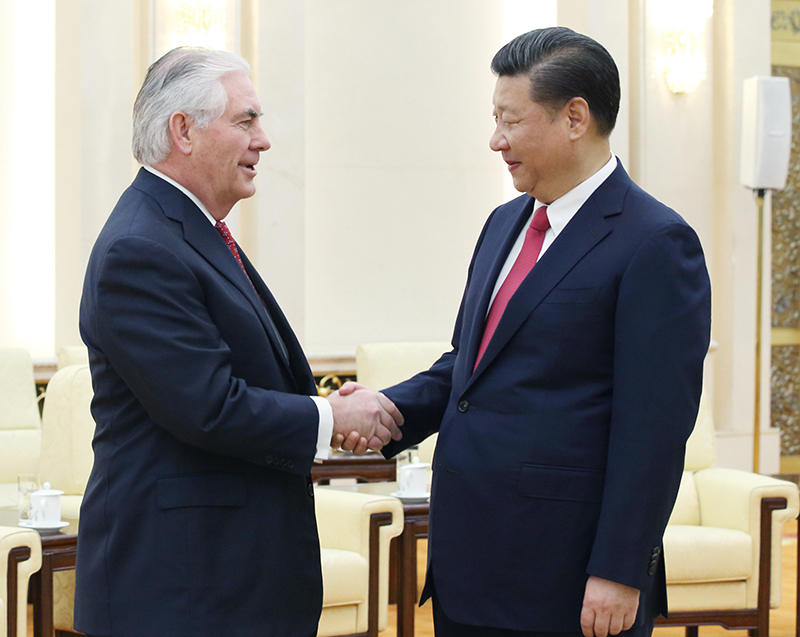
NPR reports that Rex Tillerson concluded his first trip to Asia as secretary of state, sounding optimistic about the prospects for U.S. cooperation with China on the North Korean nuclear issue.The upbeat notes he struck in Beijing contrasted with his remarks on Friday in Seoul about how all options, including military strikes against North Korea, remain on the table. As if to underline the seriousness of the situation, even as Tillerson was discussing North Korea with his Chinese hosts, North Korean leader Kim Jong-un presided over the test launch of a new rocket engine. Pyongyang called the test "of historic significance," although its capabilities and possible uses are not yet clear. On Sunday, Tillerson made no public mention of the test as he met with President Xi Jinping in the cavernous Great Hall of the People on Beijing's Tiananmen Square. Both men effused about phone calls and letters exchanged so far between Xi and President Trump. Tillerson's visit is expected to pave the way for their first meeting, as early as next month, at Trump's private club in Mar-a-Lago, Florida.
Bloomberg comments that If China's biggest online players want to chart a bigger role for themselves at home and abroad, they're going to need to start taking privacy much more seriously. The problem came into sharp focus this month, with new data showing that Chinese police had arrested 4,261 suspects in 1,886 cases related to the theft of personal information last year. That's a steep increase from prior years...If Chinese consumers lose faith in local internet companies, the government's efforts to promote technology and innovation are certain to struggle...Concerns about data security will also cramp Chinese companies' ambitions to expand overseas...The good news is that a consensus is growing in China that the problem must be addressed.
The Hill comments that Russia and China are increasingly challenging the military superiority that the United States has held since the early 1990s. Since the end of the Cold War, America's naval, air, land and space capabilities, paired with key bases in Europe and Asia, have created a strategic advantage over other major superpowers. The United States still outspends its rivals on the military, with a roughly $600 billion budget that is three times as much as Beijing's and more than six times as much as Moscow's. But much of the U.S.'s spending is paying for military operations overseas, such as the fight against the Islamic State in Iraq and Syria...China and Russia, meanwhile, are spending heavily on "modernization" to improve their militaries' quality, efficiency and overall performance. The strategy is paying huge dividends, especially for China...But China is not trying to match America's military might, experts say. Their objective is greater control over the Asia-Pacific region.
- 2017-03-17 What Should China and the US Do About North Korea?
- 2017-03-16 5 Questions Tillerson Will Have to Answer in Asia
- 2017-03-15 China to Trump: We don’t want a trade war — but if there is one, you’d lose
- 2017-03-14 Donald Trump, China’s Xi Jinping Planning to Meet Soon
- 2017-03-13 Fake China data: was it just one province?
- 2017-03-12 Schwarzman Sees Donald Trump Dialing Back Criticisms of China
- 2017-03-10 Park’s Ouster Raises Prospect of Reset With China, Kim Jong Un
- 2017-03-09 How To Decode China's Reaction To U.S. THAAD Missile Deployment In South Korea
- 2017-03-08 China wants to avert ‘head-on collision’ in the Koreas, but will Trump sign on?
- 2017-03-07 China warns of ‘consequences’ over deployment of U.S. antimissile system
- Bloomberg Tillerson Reassures Xi on Trump Meeting in 24-Hour Beijing Trip
- www.bbc.com Trump 'looks forward to visiting China' - Tillerson
- Wall Street Journal North Korea Tests US as Tillerson Meets Chinese Leaders
- Financial Times Tillerson trip fails to narrow US-China differences
- New York Times Rex Tillerson and Xi Jinping Meet in China and Emphasize Cooperation
- Bloomberg China's Home-Price Rises Speed Up, Defy Curbs
- The Washington Post China's trading partners alarmed by food import controls
- Bloomberg Secretive Billionaire Reveals How He Toppled Apple in China
- Financial Times Technology: China reboots its superpower ambitions
- Fox News Lobster-crazy China sets record for US crustacean imports
- Reuters IBM and Wanda form China cloud computing partnership
- Wall Street Journal China Kicks Property Tax to the Curb—For Now
- Reuters Chinese defense minister to visit Sri Lanka, Nepal
- CNN Xi Jinping, Rex Tillerson pledge cooperation over 'regional hotspots'
- Financial Times Chinese children protest against Seoul's Thaad defence system
- Financial Times Vietnam steps up island battle with Beijing in South China Sea
- Reuters China opposes trade protectionism, supports free trade: vice premier
- Reuters China official says anti-graft drive to target government-enterprise ties: Xinhua
- Reuters Chinese Premier Li to visit New Zealand, Australia
